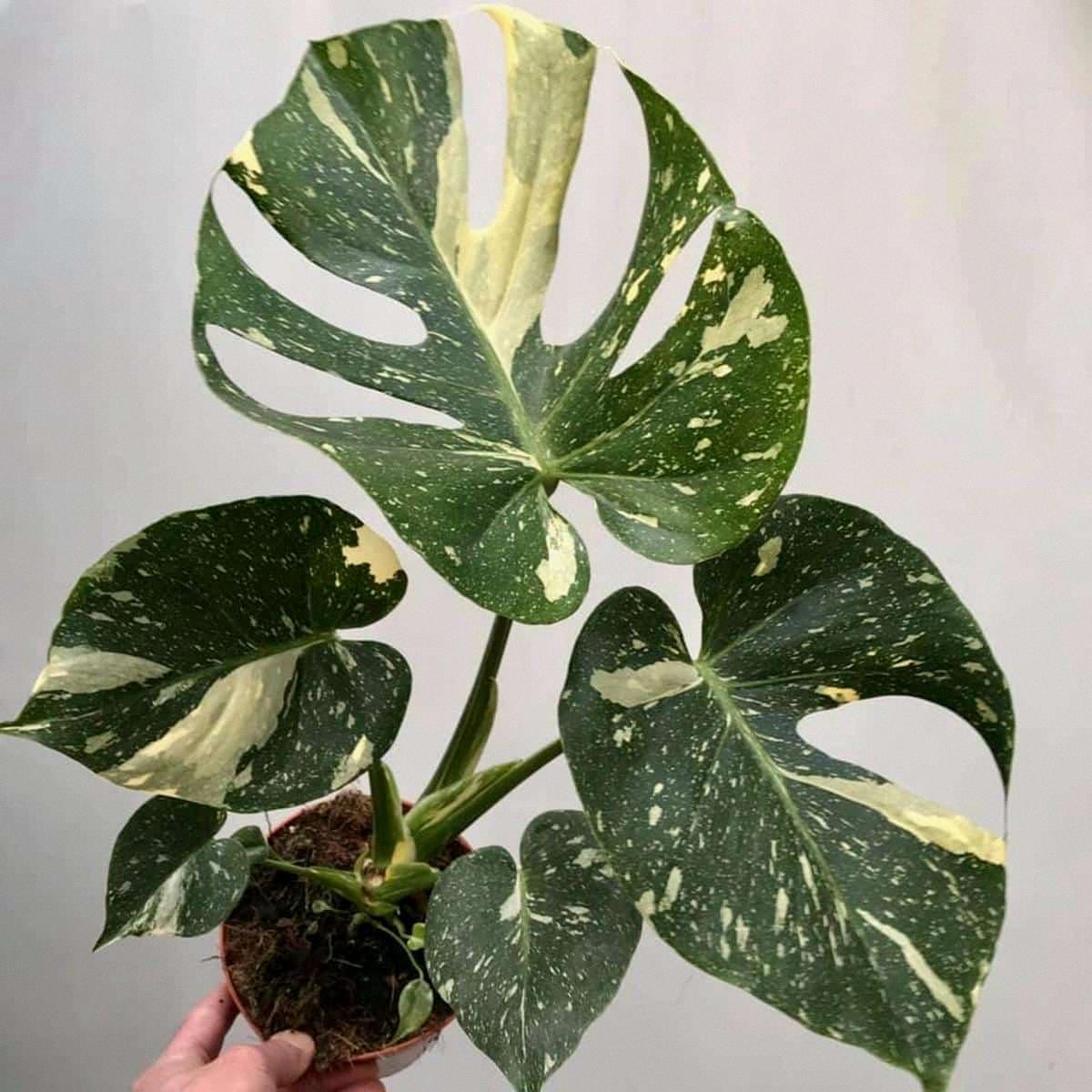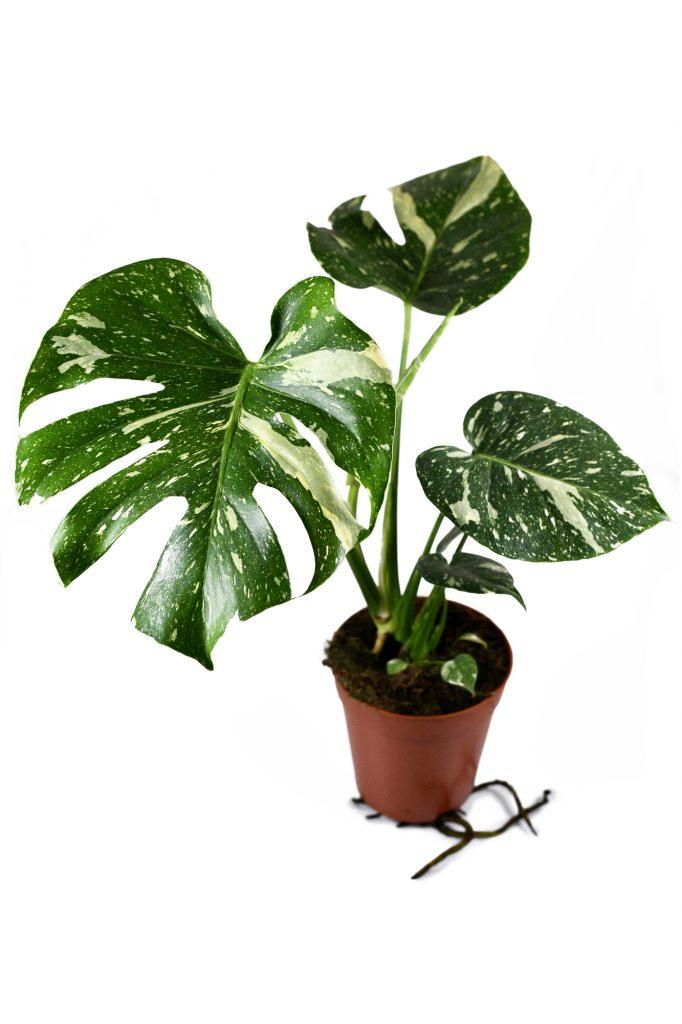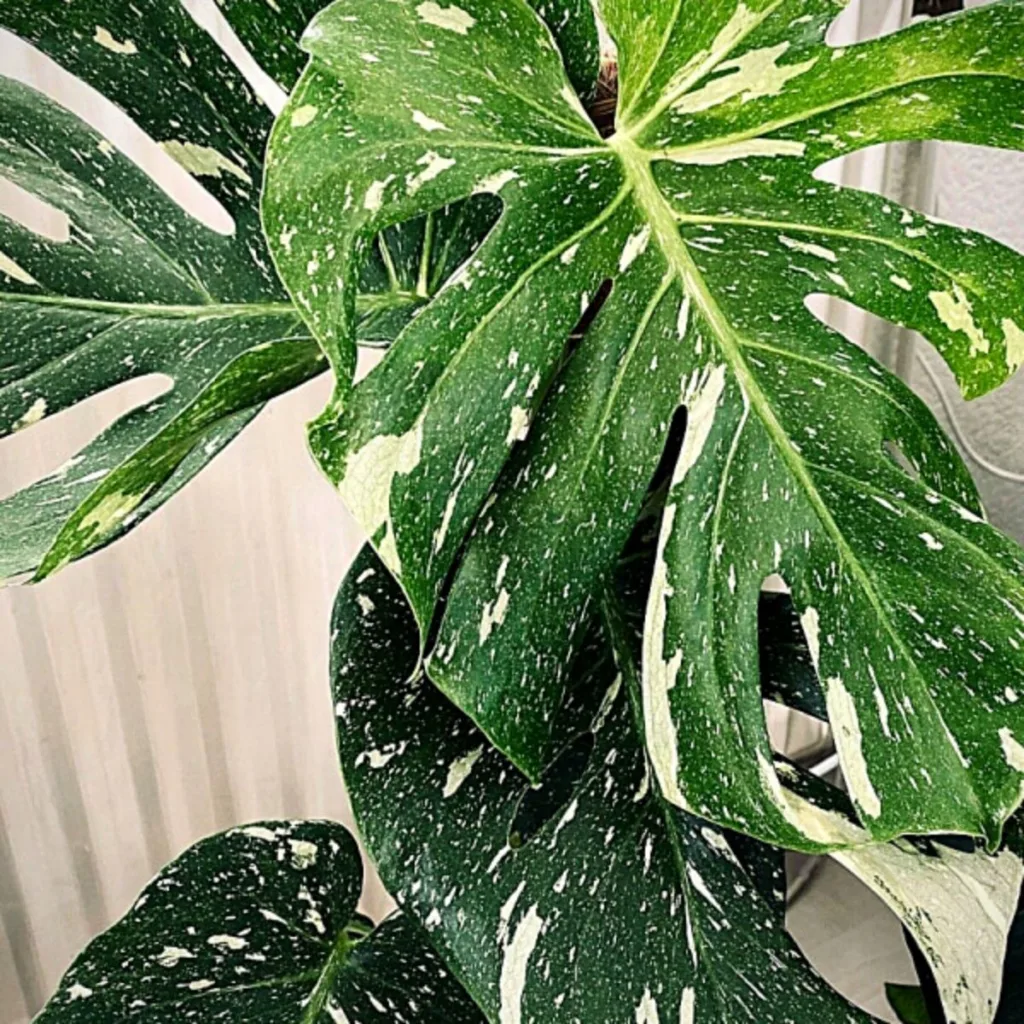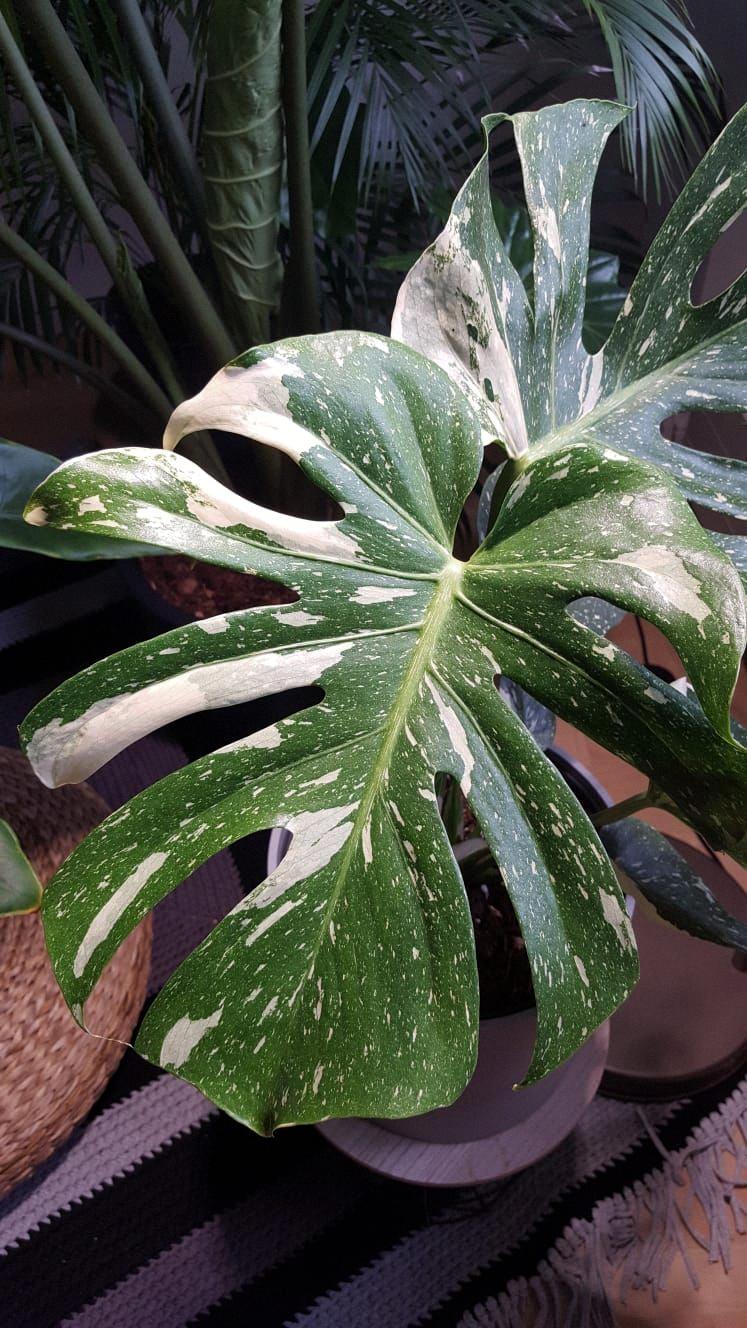If you’re a proud owner of a Monstera Thai Constellation, you may have heard rumors about the plant reverting back to its non-variegated form. But is there any truth to this claim? Let’s take a closer look at the science behind variegated plants and how it affects the Thai Constellation.
First of all, it’s important to understand that variegation is caused by a genetic mutation in the plant’s cells. In the case of the Thai Constellation, this mutation was induced through tissue culture, resulting in the plant’s unique speckled pattern. This variegation is stable, meaning that it is present throughout the plant and will not disappear over time.
However, there is a phenomenon known as reversion, which can occur in variegated plants. Reversion happens when a plant’s non-mutated cells begin to outgrow the mutated cells, resulting in a loss of variegation. This can happen due to a number of factors, including stress, disease, or genetic instability.
So, can a Monstera Thai Constellation revert back to its non-variegated form? Technically, yes, it is possible. However, this is a rare occurrence and typically only happens in plants that are under stress or have been poorly cared for. In most cases, a healthy and well-cared-for Thai Constellation will maintain its variegation for its entire lifespan.
To ensure that your Thai Constellation stays healthy and happy, it’s important to provide it with the rigt conditions. This includes keeping the plant in bright, indirect light, maintaining a consistent temperature and humidity level, and watering it regularly but not allowing the soil to become waterlogged. Additionally, you should avoid fertilizing the plant too often, as this can lead to excessive growth that can stress the plant.
While it is technically possible for a Monstera Thai Constellation to revert back to its non-variegated form, this is a rare occurrence that typically only happens in plants that are under stress. By providing your Thai Constellation with proper care and attention, you can enjoy its beautiful variegation for years to come.
The Stability of Thai Constellations
Yes, the Thai Constellation is a stable variegation. It is a genetically engineered tissue culture that maintains its ‘star-like’ speckled variegation when the plants reach maturity. This stability means that cuttings can be made from mature plants, similar to the Borsigiana, and still maintain the unique variegation pattern of the Thai Constellation. Overall, the Thai Constellation is a stable and reliable plant for those looking to add a unique and eye-catching plant to their collection.

Source: homespursuit.com
Exploring the Variegation of Thai Constellation
Yes, Thai Constellation is a variegated plant. It has a unique and striking appearance due to its variegation, which is a result of genetic manipulation in labs through tissue culture. This plant has stable variegation, which means that the mutated cells responsible for its variegation are present throughout the plant. As a result, you don’t need to prune the stems to maintain its variegation as it will continue to grow in this way.
Caring for Thai Constellations
Thai Constellation Monstera plants are not necessarily hard to care for, but they do require some specific considerations. Compared to their all-green Monstera relatives, Thai Constellations are less tolerant of drying out and have slower growth rates. They are also more sensitive to light, temperature, humidity, and fertilizer. To care for them properly, it is important to provide them with bright, indirect sunlight and to avoid exposing them to direct sunlight. They also prefer temperatures between 60-80°F and require high humidity levels, so it is recommended to mist their leaves regularly or use a humidifier. Additionally, Thai Constellations shoud be watered when the top inch of soil is dry to the touch, but they should not be overwatered as this can lead to root rot. Fertilizing them once a month during the growing season is also recommended. With these considerations in mind and proper care, Thai Constellations can thrive and make a beautiful addition to any plant collection.
Exploring the Climbability of Thai Constellations
Yes, Thai Constellations are upward climbing shrubs. They have aerial roots that allow them to attach theselves to a support structure, such as a moss pole or trellis, and climb upwards. This climbing behavior is a natural adaptation of the plant in its native habitat, where it grows as an epiphyte on the trunks of trees in the rainforests of Thailand. As a houseplant, Thai Constellations can be trained to climb by providing them with a suitable support structure and by regularly pruning and training their vines. It is important to note that Thai Constellations can grow quite large, so it is essential to provide them with adequate space and support to ensure their healthy growth and development.
The Benefits of Misting a Thai Constellation
Yes, you should mist your Thai Constellation about two times a week. This will help to increase the humidity levels arund the plant, which is important since these plants are native to tropical regions and thrive in high humidity environments. However, be careful not to soak the plant too much as a constantly wet soil surface can attract fungus gnats. Instead, give the plant a light misting, making sure to evenly distribute the water across the leaves. Additionally, ensure that there are no drafts or vents nearby, especially during the winter, as this can cause the plant to dry out too quickly. By misting your Thai Constellation regularly, you will help to keep it healthy and thriving.

Source: pottedpixie.com
Is Investing in Monstera Thai Constellation Worth It?
The Monstera Thai Constellation is certainly worth the investment for plant enthusiasts looking for a unique and stunning addition to their collection. While it is one of the more expensive houseplants available, its variegated leaves with creamy white splashes against a backdrop of deep green are truly breathtaking.
The Thai Constellation Monstera is also a conversation starter and can add an interesting focal point to any room. Its rarity and exotic appearance make it a highly sought-after plant, so ownng one can be a source of pride for plant lovers.
Furthermore, the Monstera Thai Constellation is relatively easy to care for and can thrive in a variety of conditions, including bright indirect light and moderate humidity levels. Its versatility and low-maintenance nature make it an excellent choice for both novice and experienced plant owners.
In summary, while the Monstera Thai Constellation may be costly, its unique beauty, rarity, and ease of care make it a worthwhile investment for plant lovers looking for a show-stopping addition to their collection.
Causes of Yellowing of Thai Constellation Plants
If you notice that your Thai Constellation plant is turning yellow, there could be a few reasons why this is happening. One possible reason is that the plant is not receiving enough light. Thai Constellation plants require bright, indirect light to thrive. If the plant is not getting enough light, the leaves may start to turn yellow and drop off.
Another possible reason for yellowing leaves on a Thai Constellation plant is a buildup of salt in the soil. If you have been fertilizing the plant regularly, it is possible that the soil has become too salty, which can cuse the leaves to turn yellow and even brown. To remedy this situation, you should flush the soil by thoroughly watering the plant and allowing the water to drain out of the bottom of the pot. Repeat this process a few times to help remove excess salt from the soil.
Finally, it is important to make sure that your Thai Constellation plant is not being overwatered. Overwatering can lead to root rot, which can cause the leaves to turn yellow and drop off. Make sure that the plant is not sitting in water for extended periods and that the soil is allowed to dry out slightly between waterings.
In summary, if your Thai Constellation plant is turning yellow, it may be due to a lack of light, a buildup of salt in the soil, or overwatering. By addressing these issues, you can help your plant to regain its health and vibrancy.
The Growth Rate of Thai Constellations
Yes, Thai Constellations are generally slow growers. They require patience and consistent care in order to thrive. They typically grow at a slower rate compared to other Monstera varieties, but with proper care and optimal growing conditions, they can eventually reach their full potential. It’s important to note that even though they are slow growers, they are still beautiful and unique plants that are worth the wait.
Increasing Variegation in Thai Constellation Plants
If you want to encourage the variegation of your Monstera Thai Constellation, there are a few things you can do. Firstly, make sure that you place the plant in a spot where it receives plenty of bright, indirect light. This will help to activate the plant’s variegation genes and promote the growth of more variegated leaves.
Next, ensure that you water your plant regularly and keep the soil moist but not waterlogged. This will help to ensure that the plant is able to take up the nutrients it needs to produce healthy, variegated leaves.
You may also want to consider fertilizing your Monstera Thai Constellation with a balanced, water-soluble fertilizer every few weeks during the growing season. This will provide your plant with the nutrients it needs to produce more variegated leaves.
Finally, consider pruning your Monstera Thai Constellation to encourage the growth of new shoots and leaves. This will help to keep the plant healthy and promote the development of new variegated growth.
Overall, by provding your Monstera Thai Constellation with plenty of light, water, nutrients, and care, you can help to encourage the growth of more variegated leaves and keep your plant looking its best.

Causes of Curling Leaves on Thai Constellation Plants
If your Thai Constellation plant’s leaves are curling, it could be due to several reasons. One common cuse is low humidity levels, as this plant prefers higher humidity levels. If the air in your home is dry, the leaves may lose water and curl. Another reason could be overwatering or underwatering, which can both cause stress to the plant and result in curled leaves. It’s essential to ensure that you’re watering your Thai Constellation correctly, allowing the soil to dry out between watering sessions. Additionally, direct sunlight can cause leaf curling, so it’s best to place the plant in bright, indirect light. Finally, pests such as spider mites or thrips can also cause leaf curling, so inspect your plant regularly and treat any infestations promptly.
The Rarest Constellation in the World
The rarest constellation in the world is considered to be Ophiuchus. This constellation is quite large and straddles the celestial equator. Its name originates from the Greek word Ὀφιοῦχος, whih is commonly represented as a man grasping a snake. Ophiuchus is often overlooked due to its location in the night sky and is not included in the traditional 12 zodiac signs. However, it is still recognized as a constellation and is present in various star maps and astronomical charts. The rarity of Ophiuchus lies in its significant size and the fact that it is not widely known or recognized as a distinct constellation.
The Causes of Browning in Thai Constellations
If you’ve noticed brown, crispy edges on your Thai Constellation, there could be a few reasons for this. One common cause is a lack of humidity – this plant is native to tropical regions and needs plenty of moisture in the air to thrive. You can increase humidity arund your plant by misting it regularly, using a humidifier or placing a tray of water nearby.
Another potential cause of browning could be too much direct sunlight. While this plant does need bright, indirect light to grow well, direct sunlight can lead to leaf burn and damage. Try moving your plant to a slightly shadier spot or filtering the light with a sheer curtain.
Lastly, it’s possible that your plant is not receiving enough water or nutrients. Thai Constellations like to be kept moist but not waterlogged, and they benefit from regular fertilization during the growing season. Make sure you’re watering your plant deeply and consistently, and consider adding a slow-release fertilizer to the soil. By addressing these potential issues and giving your plant the care it needs, you can help prevent further browning and keep your Thai Constellation healthy and happy.
Is the Thai Constellation Man-Made?
Yes, Thai Constellation is a man-made plant that was created through tissue culture propagation techniques in a laboratory. This process involves taking small tissue samples from the parent plant, in this case, the Monstera deliciosa, and growing them in a controlled environment under specific conditions to produce a new plant with desired characteristics. Thai Constellation is a yellow-to-white variegated plant that was developed in a tissue culture laboratory in Thailand, which is where it gets its name. So, while Thai Constellation may have natural origins, it is not a naturally occurring plant and was created through human intervention.

Source: pinterest.com
Causes of Drooping in Thai Constellations
If you notice that your Thai constellation Monstera plant is drooping, the most common cause is likely due to excessive heat. This plant prefers to be kept in a warm environment, but if the temperature is too hot, the leaves will start to droop and may even turn brown around the edges. It’s important to make sure that your plant is not placed in direct sunlight or near a heat source such as a heater or air conditioning vent. Additionally, check the soil to make sure it is not too dry, as this can also cause drooping. Water the plant thoroughly and allw the soil to drain properly before placing it back in its spot. It’s important to maintain a temperature range between 68 and 86 degrees Fahrenheit to prevent further drooping and promote healthy growth.
Conclusion
In conclusion, Thai Constellations are a genetically engineered type of Monstera that exhibits stable variegation. This means that the plant’s variegation is maintained through its cells, and it will not revert to an all-green form. Unlike the Variegated Monstera Deliciosa Borsigiana, which may revert to its all-green form if not properly cared for, Thai Constellations will maintain their unique and stunning variegation. However, it’s essential to note that Thai Constellations require specific care, such as consistent moisture, appropriate lighting, and fertilizer, to thrive and maintain their variegation. With proper care, Thai Constellations are a beautiful and unique addition to any plant collection.
